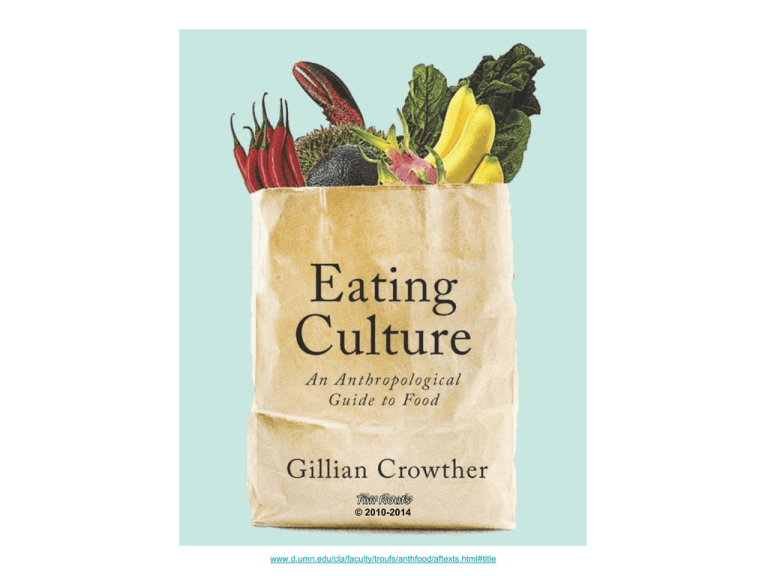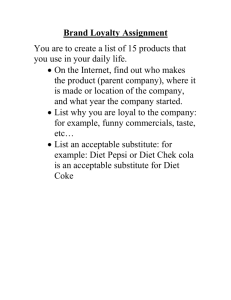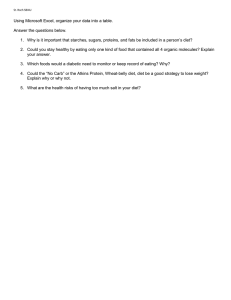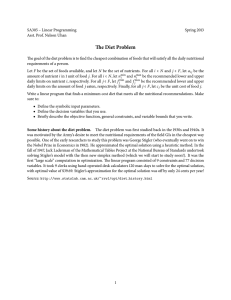© 2010-2014 www.d.umn.edu/cla/faculty/troufs/anthfood/aftexts.html#title
advertisement

© 2010-2014 www.d.umn.edu/cla/faculty/troufs/anthfood/aftexts.html#title © 2010-2014 www.d.umn.edu/cla/faculty/troufs/anthfood/aftexts.html#title © 2010-2014 www.d.umn.edu/cla/faculty/troufs/anthfood/aftexts.html#title the Biocultural Framework for the Study of Diet and Nutrition includes • Nutritional Status • Biological Makeup • Human Nutrient Needs individual nutritional needs • Diet • Cuisine • The Environment • Physical Environment • Sociocultural Environment • Economic and Political Environment in food studies diet is not a dreaded word . . . it simply “refers to the actual foods that individuals or groups consume to meet their nutrient needs” The Cultural Feast, 2nd ed., p. 9 “diet” BUT at times the authors of The Cultural Feast use “diet” in the collective sense and at other times they are concerned with how the foods and dishes in a particular cultural and physical context affect the specific food intake of individuals living in that setting The Cultural Feast, 2nd ed., p. 9 “diet” at times the authors of The Cultural Feast use “diet” in the collective sense and at other times they are concerned with how the foods and dishes in a particular cultural and physical context affect the specific food intake of individuals living in that setting The Cultural Feast, 2nd ed., p. 9 “diet” at times the authors of The Cultural Feast use “diet” in the collective sense but more often than not, and at other times they are concerned with how the term refers to . and . . physical foods andthe dishes in a particular cultural context affect the specific food intake of individuals living in that setting The Cultural Feast, 2nd ed., p. 9 thus the box labeled “diet” in the biocultural model diagrammed on p. 4 of The Cultural Feast contains “individual nutritional status” The Cultural Feast, 2nd ed., p. 9 The Cultural Feast, 2nd ed., p. 4 so in terms of the “units of analysis” “diet” will usually be the focus of inquiry as an item itself or it may be part of as in, for e.g., “The Atkins Diet” a focus on the individual(s) so in terms of the “units of analysis” “diet” will usually be the focus of inquiry as an item itself or it may be part of a focus on the individual(s) thus the “diet” . . . “units of analysis” usually includes: – one person – – – – – – the family (occasionally) the community a region a “culture area” a culture / “subculture” a nation – an item or action itself – a “cultural metaphor” if the focus of inquiry is something having to do with a group then, in food research, that is known as . . . Biocultural Framework for the Study of Diet and Nutrition • • • • Nutritional Status Biological Makeup Human Nutrient Needs Diet individual nutritional needs • Cuisine • The Environment • Physical Environment • Sociocultural Environment • Economic and Political Environment “cuisine” “refers to the foods, food preparation techniques, and taste preferences that are shared by the members of a group of people” The Cultural Feast, 2nd ed., p. 9 so “cuisine” “refers to the foods, food preparation techniques, and taste preferences that are shared by the members of a group of people” applies only to groups of people that share a culture The Cultural Feast, 2nd ed., p. 9 in the biocultural model diagrammed on p. 4 of The Cultural Feast “diet” is nested within “cuisine” to demonstrate that a given set of preferred preparation techniques and dishes that characterize a particular culture group has an important impact on the diets of the individual members The Cultural Feast, 2nd ed., p. 10 The Cultural Feast, 2nd ed., p. 4 so in terms of the “units of analysis” “cuisine” may be the focus of inquiry with any unit that pertains to a group and is usually reserved for a culture, subculture, and, but only occasionally, a nation usually a “community” would not have its own “cuisine” apart from a possible identity with a microcultural group but a “cuisine” could be part of a metaphorical analysis ... thus the “cuisine” . . . “units of analysis” may include: – one person – the family – the community – – – – a a a a region “culture area” culture / “subculture” nation – an item or action itself . . . – a “cultural metaphor” thus the “cuisine” . . . “units of analysis” may include: – one person – the family – the community – a region and, as mentioned, – a “culture area” a cuisine could also be considered as – a culture / “subculture” – a nation – an item or action – a “cultural metaphor” itself with regard to diet “It is important to note that while acquired food preferences and tastes that are common among any particular group are power influences on diet, people also eat novel food or, at times, simply deviate from the group’s preferences” The Cultural Feast, 2nd ed., p. 10 with regard to diet “It is important to note that while acquired food preferences and tastes that are common among any particular group are power influences on diet, people also eat novel food or, at times, simply deviate from the group’s preferences” The Cultural Feast, 2nd ed., p. 10 cuisines “It is also worth noting that a society’s cuisine interacts with its members’ biological makeup and nutrient requirements” The Cultural Feast, 2nd ed., p. 10 so basically, as a rule of thumb “diet” refers to individuals or an item “cuisine” refers to groups (with the exceptions noted above) © 2010 Irish corned beef and cabbage http://s184.photobucket.com/albums/x318/RennyBA/StPatricksDayOslo2008/IrishStew.jpg © 2010-2014 www.d.umn.edu/cla/faculty/troufs/anthfood/aftexts.html#title



